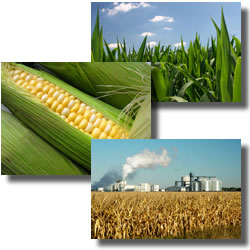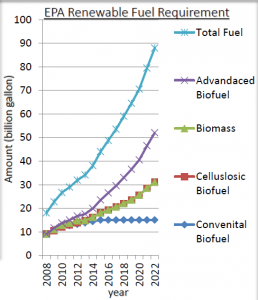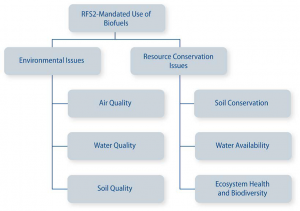- In December of 2007 Congress enacted the Energy Independence and Security Act (EISA), with the the goal of the act to reduce the dependence on foreign oils.
- The EISA also had the goal of addressing issues with climate change and reducing greenhouse gases.
- The Renewable Fuel Standards is a program developed and regulated by the Environmental Protection Agency (EPA) under the Energy Policy Act in 2005. Renewable Fuel Standards programs regulations were developed with help from refiners, renewable fuel producers and other stakeholders who contributed to renewable fuels in the US.
- In 2007, the EISA required the EPA to revise the Renewable Fuel Standards and mandated an increase of required renewable fuels blended into transportation fuels to 36 billion by 2022.
- Also under the EISA the Renewable Fuel Standards expanded the program to include diesel and gasoline. New categories of renewable fuel were established and volume requirements were also set.
- February 2010, the Renewable Fuel Standards set new standards for cellulosic biofuels, biomass-based diesel fuel, advanced biofuel, and total renewable fuel in transportation fuel
- The second Renewable Standards program (RFS2) was created to achieve the goals of reducing import of petroleum, reducing the greenhouse gas emissions from renewable fuels, and to encourage the development of the nation’s renewable fuel sector.
- The EISA mandated cellulosic biofuels must offer a 60% cycle greenhouse gas reduction relative to gasoline.
- This mandated was intended to make sure that the renewable fuel is emitting less greenhouse gas emissions than the petroleum fuel it is replacing. The purpose of having renewable fuels is to ensure that the fuel will be sustainable however a small amount of biofuels end up causing more emissions than conventional gasoline.
- Due to the impacts that biofuels can have on efficiency of global food system, greenhouse gas emissions, soil quality, water, air quality and biodiversity there will be need for more policy on the production of biofuels.
- Controversy that surrounds the increasing usage of biofuels is land clearing and increased agriculture for biofuel production. This is a controversy because in some countries too much land could possibly be cleared in order to meet the potential demands for biofuels. Brazil is a country that is producing large amount of biofuels. However Brazil would have to clear land like the Amazon
 Rainforest to grow enough food for the people and transportation fuel. This would than have an adverse effect since the rainforest was just cleared and released emissions in order to have a sustainable fuel. The International Energy Agency often warns, that although biofuels are an excellent alternative to other fuels there is a need for regulation and policy around the production of biofuels. Without policy or regulation more harm can be done to the land and cause more environmental problems then before.
Rainforest to grow enough food for the people and transportation fuel. This would than have an adverse effect since the rainforest was just cleared and released emissions in order to have a sustainable fuel. The International Energy Agency often warns, that although biofuels are an excellent alternative to other fuels there is a need for regulation and policy around the production of biofuels. Without policy or regulation more harm can be done to the land and cause more environmental problems then before. - However new environmental polices in the United States on biofuels and production of biofuels is being hindered by political influences and polarization in the current government.
The chart pictured above are the main concerns that the EPA made in a report to congress about the mandate increase by the EISA of biofuel production under the Renewable Fuel Standards. The first report made to the US Congress about concerns over environmental harm and need for policy on increasing biofuel production was made in 2011. Since the report is triennial the next report will come out this year (2014).
Primary Author: Kaitlyn Koch
Editor: John Marshall
Resources:
U.S. Environmental Protection Agency. 2011. “Biofuels and the Environment: First Triennial Report to Congress.” Office of Research and Development, National Center for Environmental Assessment, Washington, DC; EPA/600/R-10/183F.
Tilman, David, Robert Socolow, and Jonathan Foley. “Benefical Biofuels.” Science Magazine 17 July 2009: 270-71. Web. 30 Apr.2014.
http://www.epa.gov/OTAQ/fuels/renewablefuels/


